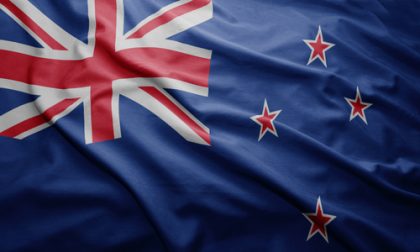New Zealand to Consider Blacklists, Credit-Card Bans to Curb Offshore Online Gambling
New Zealand is the latest country to consider methods of restricting its citizens from gambling on international online sites as part of the government’s desire to ensure revenue derived from Kiwi’s gambling activities stays within the country. The news comes from Internal Affairs Minister Tracey Martin, who recently announced that her Ministry has launched an open consultation into online gambling activity.
Currently, it is legal for New Zealanders to gamble online, though the only New Zealand-based entities that are licensed to offer such services are the state-run Lotto New Zealand for lottery offerings and the New Zealand Racing Board and its online TAB (Totalisator Agency Board) sports betting services. All other online gambling undertaken by New Zealanders thus occurs on offshore, unregulated (by New Zealand) sites.
News features published immediately in the wake of Mrs. Martin’s July 31 pronouncement focused on the most extreme measures being considered by her Ministry, namely a possible ban on credit cards being used to fund online gambling accounts or even a blacklist to stop internet connectivity to offshore gambling sites. The latter is the most extreme option and would likely run into opposition from anti-censorship groups, though a credit-card ban is technically feasible, more palatable to neutral observers, and mirrors consideration or actual enactment of similar bans in other countries.
SkyCity Deal Triggers Government Pushback
The New Zealand move is widely believed to have been triggered by SkyCity’s decision in May to offer online gambling through a branded casino site operated by Malta-based Gaming Innovation Group (GiG). SkyCity operates five land-based casinos in New Zealand, the largest of those being in Auckland, New Zealand’s capital city.
Though SkyCity’s move online is designed to protect and expand its own casino-games brand presence, it nonetheless ruffled the feathers of government officials who saw it as a threat to the government’s own “official” online-gambling monopoly. When the deal was announced, Martin said she was “disappointed they are forging ahead” but said the move showed the inadequacy of existing laws.
The consultation, which will be open for submissions for two months, ending on September 30, 2019, appears to be the first part of the government’s response to SkyCity’s planned online expansion, though that deal is pointedly not mentioned in the Internal Affairs Ministry’s announcement of the open consultation.
“Our current Gambling Act is from 2003 and like a lot of legislation it is being challenged by the place of the internet,” Martin said. “New technology has changed people’s behavior dramatically and the way New Zealanders gamble has changed too. It’s now timely to check whether our gambling rules are appropriate.”
According to the Ministry, New Zealanders have spent about $380 million on offshore gambling sites in the last year and a half. “A lot of New Zealanders enjoy gambling and it’s not our intention to stop this,” added Martin. “However the growth in online gambling challenges our current approach.”
Multiple regulatory avenues available
The Ministry’s announcement also follows the traditional game plan of promoting public health rather than acknowledging that it’s really all about the money. The statement declares that the current (but antiquated) regulator regime is based around three principles:
- Communities benefit from the proceeds of gambling;
- New Zealanders gamble with trusted operators; and
- Gambling-related harm is minimised (with the cost of minimisation and mitigation being carried by gambling providers).
“The problem we have is that, unlike domestic gambling operators, offshore online gambling operators do not pay to mitigate the harm their industry causes, nor do they contribute to the community through funding grants,” Martin said. “We also need to assess whether they sufficiently protect vulnerable New Zealanders, particularly our young people who can spend a lot of time online. The discussion document outlines key issues and seeks feedback on a range of options.
“For example, New Zealand could establish a licensing system, where online providers must meet certain conditions to be able to legally offer their services in New Zealand. This is what Australia and the United Kingdom do. There are also several tools that could be implemented to limit New Zealander’s access to online gambling sites. These include geo-blocking access to overseas gambling sites or banning the use of credit cards for online gambling.”
The mention of a possible credit-card ban mirrors similar considerations being conducted at the present time by the United Kingdom’s Gambling Commission, and of course served as the headline magnet, since ease of deposit is naturally a primary component in the overall success of online gambling sites.
Consultation survey open to public
The open consultation is indeed fully open, meaning that New Zealand’s gamblers are free to submit responses in addition to industry stakeholders and other entities, the bulk of those often being religious and anti-gambling entities. The consultation form shows that the Internal Affairs Ministry is indeed considering four basic options:
- OPTION 1 (STATUS QUO): Lotto and TAB offer existing gambling products
Operators: Lotto and TAB / Products: Online lotteries, racing and sports betting etc - OPTION 2: Extend gambling products Lotto and TAB may offer
Operators: Lotto and TAB / Products: online lotteries, racing and sports betting etc, plus new varieties of online gambling products - OPTION 3: Licensing of domestic operators
Operators: any NZ charitable or NZ commercial operation / Products: eg. online casino-type products or any online gambling product - OPTION 4: Tick your preferred option:
Licensing of domestic operators
Licensing overseas operators
Licensing both domestic and overseas operators
Operators: any NZ or overseas commercial or charitable operation / Products: eg. online casino-type products or any online gambling
The consultation also asks for input on topics such as possible controls on online gaming offerings that include gambling elements. This remains a global hot-button issue for those seeking stricter controls over channels that can be exploited by underage gamblers. The form asks for yes-or-no choices on these possible regulatory options:
- Influence online game makers to not include gambling-like elements in future games
- Require warnings about to be placed on online games including gambling-like elements
- Ban games which demonstrate the characteristics of gambling





















COMMENTS